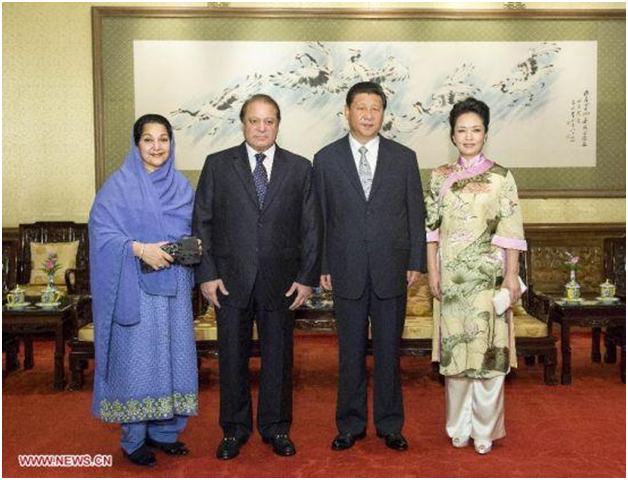China's President XI Jinping Postpones Pakistan Visit
Pakistan Prime Minister Nawaz Sharif on a visit to China with Chinese President Xi Jinping

NEW DELHI: Chinese President Xi JiNping has postponed his first state visit to Pakistan, citing the ongoing anti-government protests in the South Asian country as the reason for the deferral.
"In view of the current political situation in Pakistan, the governments of China and Pakistan have mutually agreed to postponement of the state visit of HE Xi Jinping, president of China, to Pakistan, which was scheduled to take place later this month," Pakistan’s Foreign Ministry said in a statement on Saturday.
"Both sides attach high importance to the visit of President Xi Jinping to Pakistan, as early as possible, for promoting mutually beneficial cooperation between the two," China’s Foreign Ministry said.
Over $34 billion worth in deals was scheduled to be discussed during this visit, with no new dates being announced thus far. As reported by Bloomberg, China remains largest trading partner, with total trade in 2013 valued at $15.3 billion. The postponement of the Chinese Premier’s visit, hence, is a troubling development for the Pakistani government -- which is currently facing an economic crisis complicated by power shortages and condition of an International Monetary Fund bailout.
Pakistani Prime Minister Nawaz Sharif in turn told the country’s Parliament that the news of the delay was expected as it follows cancellations of visits by Presidents of Sri Lanka and the Maldives, also in connection with the ongoing protests.
The protests are being led by Pakistan Tehreek-i-Insaf (PTI)’s Imran Khan and Pakistan Awami Tehreek (PAT)’s Tahirul Qadri, and involving thousands of people calling for Sharif’s resignation.
Earlier, the United States issued a strong statement condemning Khan and Qadri’s actions, saying extra-constitutional transfer of power in Pakistan is unacceptable, and that those “attempting to impose these changes” should refrain from doing so. “Nawaz Sharif was elected and is prime minister. There is a government that was elected and is in place,” Marie Harf, State Department deputy spokesperson, said, adding ““We support the constitutional and electoral process in Pakistan...That was a process they followed, an election they had, and we are focused on working with Pakistan… And we do not support any extra-constitutional changes to that democratic system or the people attempting to impose them.”
Khan, in turn, accused the US of interfering in Pakistan’s internal affairs, adding that the Pakistan Muslim League - Nawaz (PML-N) government is a “servant of the US” that “polishes the shoes of the Americans”.
Referring to his main charge, Khan, who is calling for Sharif’s resignation based on suspicions that the elections were rigged, asked, “If an election took place in the US and a Congressman said that a majority of the votes could not be verified, wouldn't that constitute a full blown enquiry in America?”
Qadri, who has found common ground with Khan on the issue of Sharif’s resignation, differs on the grounds that the PAT movement, instead of calling for fresh elections as Khan is, wants to replace the current government with a national government composed of technocrats.
Although the Sharif government had not moved to stop the marches, its actions demonstrated that it took the challenge seriously. This would explain the ban on gatherings, the impounding of vehicles, the closing of petrol stations and the deployment of troops to Islamabad. Ironically however, Sharif’s decision to deploy the army has given his critics more fodder, seemingly indicating that Pakistan’s civilian administration is still heavily reliant on the country’s military, which has ruled Pakistan through a series of coups, for protection.



